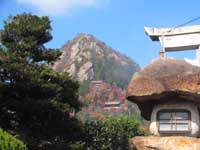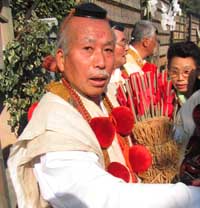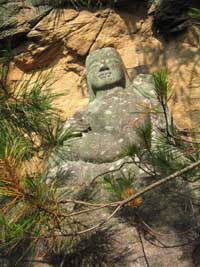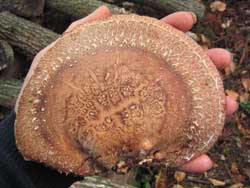
May the splendor of true wealth
be yours in the Year of the Rooster.
Views from a Japanese mountainside

From The Kyoto University Library Collection
via wolfdog at MetaFilter
 Since Mr. S. lives across the Lake, is a busy man and his delicious rice is increasingly in demand, he is not that easy to get hold of. When at last we did get reach him a few days ago, he had said he'd deliver our 60 kg before 10 a.m. on Sunday, but this was very before 10 am (folks who get up as early as we do tend to think everyone else’s day starts later) so we had to run all the way back while watching to see if Mr. S. might give up and drive away with our genmai. I had dallied earlier to take some photos, so Echo had a head start and got back just as he was turning around in the driveway to head back down the mountain.
Since Mr. S. lives across the Lake, is a busy man and his delicious rice is increasingly in demand, he is not that easy to get hold of. When at last we did get reach him a few days ago, he had said he'd deliver our 60 kg before 10 a.m. on Sunday, but this was very before 10 am (folks who get up as early as we do tend to think everyone else’s day starts later) so we had to run all the way back while watching to see if Mr. S. might give up and drive away with our genmai. I had dallied earlier to take some photos, so Echo had a head start and got back just as he was turning around in the driveway to head back down the mountain.
Mr. S. is a tall, handsome, healthy, loquacious, elegantly dressed 80-year-old who moves like a much younger man. He is also a bonsai master; one of his black pine creations was in the back of his truck beside our 60 kg of genmai; he is selling some of his collection. The 60 kg he brought us will last the two of us about 5-6 months if we eat our usual amount of rice, but Kaya and the twins are coming, so this is more likely a 4-month supply.
Mr. S. grows organic rice using rice bran and a fermentation process in a method he has developed on his own and is trying to get patented, from which he produces fully organic genmai using no chemical fertilizers, herbicides, pesticides, fungicides or othercides. This is especially important with brown rice, which is so much closer to the actual state of cultivation. But what is amazingly more, he charges about 1/3 less for it than other organic sources charge.
The rice he delivers is 100% brown rice; only the hulls have been removed. Our task now is to find a larger rice polisher; we like to occasionally have 80% ‘brown’ rice, or even 50% sometimes, depending on the recipe. We save the removed bran for baking bread, use it in soups or simply spread it on the garden. Mr. S.’s brown rice is definitely the best way to eat grains. Plus we're forced to run back to the house now and then. I’ll have to see about maybe getting one of his cherry bonsai...

ifbot: "How are you feeling today?" Me: "Quite a bit worse, actually."
 As we ambled though the pleasant roadside gauntlet of smiling farmer ladies selling their vegetables, beans, konnyaku, country-style pickles etc., occasional glances upward showed why the mountain had become a focus of the sacred. Throughout the millennia (the shrine was finally built in the 7th century), this mountainside was clearly the place for anyone who wanted to be alone; any sanctity-directed soul in this neighborhood who sought natural solitude in proximity to heaven must have been drawn here like a magnet.
As we ambled though the pleasant roadside gauntlet of smiling farmer ladies selling their vegetables, beans, konnyaku, country-style pickles etc., occasional glances upward showed why the mountain had become a focus of the sacred. Throughout the millennia (the shrine was finally built in the 7th century), this mountainside was clearly the place for anyone who wanted to be alone; any sanctity-directed soul in this neighborhood who sought natural solitude in proximity to heaven must have been drawn here like a magnet.
 Thence upward in suitably elder fashion along the trail through chants and bells, prayer handclaps and red carpets of leaves past platforms and copper-roofed shrines to all the gods, including me (above one altar is a Shinto mirror; just visit to be whom you worship) that are tilted out on stilts or jammed in caves and crevices and ravines...
Thence upward in suitably elder fashion along the trail through chants and bells, prayer handclaps and red carpets of leaves past platforms and copper-roofed shrines to all the gods, including me (above one altar is a Shinto mirror; just visit to be whom you worship) that are tilted out on stilts or jammed in caves and crevices and ravines...
 Further up along the stilted walk was my personal favorite, Benzaiten (goddess of the arts) above her cave, then on to and through the giant rock that was split by the gods way before even the first inkling of history; passing through the split at the end of your climb you are reborn onto that small platform also known as life, in front of the shrine of Tarobo, the timeless goblin of the mountain. Here in vast distances the eye swallows whole are tiny homes down there, and moving among them mere specks like yourself, going about life much as you do when you're not gasping for air way up here, where it is growing cold, the horizon is darkening, end of day is nearing, time to start down and begin another life...
Further up along the stilted walk was my personal favorite, Benzaiten (goddess of the arts) above her cave, then on to and through the giant rock that was split by the gods way before even the first inkling of history; passing through the split at the end of your climb you are reborn onto that small platform also known as life, in front of the shrine of Tarobo, the timeless goblin of the mountain. Here in vast distances the eye swallows whole are tiny homes down there, and moving among them mere specks like yourself, going about life much as you do when you're not gasping for air way up here, where it is growing cold, the horizon is darkening, end of day is nearing, time to start down and begin another life...


Almost exactly a year ago I posted about perchlorate, an explosive additive to rocket fuel that had been found in lettuce in the Colorado area; well now the EPA study is in. And to give you some idea of the true extent of this 'invisible' problem, the Environmental Protection Agency has a "Perchlorate Coordinator for the Southwest and Pacific Region." Because it's not just Colorado, the Southwest or the Pacific region.
"Federal Food and Drug Administration (FDA) tests released this week have confirmed the presence of perchlorate - an explosive additive in solid rocket fuel - in almost every sample of lettuce and milk taken in a nationwide investigation. Perchlorate, leaking from military bases and defense contractors' facilities, is known to cause regional water pollution, resulting in serious health effects.
BushGreenwatch reported last December on the stalling tactics of the Bush Administration and the Defense Department regarding a national standard for safe drinking water. [3] The EPA's preliminary risk assessment found that perchlorate should not exceed 1 part per billion (ppb) in drinking water for protecting developing fetuses, but industry and Defense Department scientists claim that as much as 200 ppb is safe for human consumption.
Problems associated with perchlorate include impaired thyroid function, tumors, cancer, and decreased learning capacity and developmental problems - such as loss of hearing and speech - in children."
And Japan wants rockets of its own...
 Speaking of Santa Barbara a couple of posts ago in re the Hisha antique auction, I mentioned my post on the auction to my brother, who lives in Santa Barbara, and he asked me to post about a house he owns in Desert Hot Springs (in Coachella Valley near Palm Springs) that he has just renovated and is putting up for rent. Take the tour (contact number inside).
Speaking of Santa Barbara a couple of posts ago in re the Hisha antique auction, I mentioned my post on the auction to my brother, who lives in Santa Barbara, and he asked me to post about a house he owns in Desert Hot Springs (in Coachella Valley near Palm Springs) that he has just renovated and is putting up for rent. Take the tour (contact number inside).
















